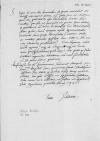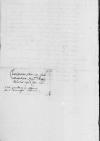Letter #605
Alfonso de VALDÉS to Ioannes DANTISCUSGhent (Gandavum), 1531-03-30
English register:
Valdés advises Dantiscus on how to agree to a price. He informs him that the emperor will spend Easter at the [Augustinian] monastery in Groenendaal near Brussels and then will return to Ghent. They haven’t considered the matter of Scipio yet. There is no news from Hungary nor about the Turks, apart from news from Italy that the [Turkish] fleet is less terrifying than rumors had it. Valdés sends Dantiscus a copy of an excerpt from a letter he received from the governor of the treasury [Pompeo Colonna]. He writes that Naples is dependent on the queen [Bona] until the matter of Monte Serico is resolved. Sigismundo Loffredo writes the same thing. Valdés encourages Dantiscus to take action on the matter.
| received Antwerp, [1531]-03-31 Manuscript sources:
Auxiliary sources:
Prints:
| ||||||||||||||||
Text & apparatus & commentary Plain text Text & commentary Text & apparatus
Clarissimo viro, domino
Salutem.
Sapis, si cum his hominibus de pretio convenire vis, antequam eorum domos intres, nam quod iure eis debetur — parum est, quod tua tu ipsis liberalitate donare soles — multum. Quo fit, ut quicquid eis praeter spem dederis, id putabunt esse lucri et beneficii loco adnumerabunt.
Rescripsit ad me
Vale.
Tuus


 UUB, H. 154, f. 48v
UUB, H. 154, f. 48v